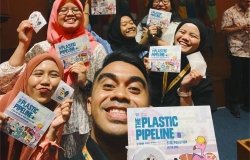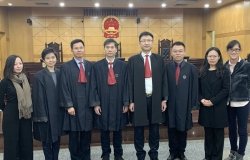World Water Day: Watering “No business can succeed in a failed society”
China Environment Forum and Circle of Blue's Chock Point China project was mentioned in a newly published article on CSRwire. Click the title to read more.
On Friday, UN special rapporteur Catarina de Albuquerque warned that government delegates to the World Water Forum appeared to be watering down their human rights commitments to water and sanitation. These rights, formally recognized by the UN in 2010, must form the basis of any proposals to expand access to essential services, said De Albuquerque.
Water is a $400 billion global industry, the third largest behind electricity and oil.
Last week (in anticipation of World Water Day) The World Water Forum, a tri-annual event, assembled 18,000 water, environmental and sanitation leaders from 173 countries with over a hundred country water ministers attending the event in Marseilles, France.
Some Progress On Drinking Water Access
In the last two decades, over 2 billion people gained access to improved drinking water sources. United Nations Secretary-General Ban Ki-moon said recently:
“Today we recognize a great achievement for the people of the world. This is one of the first MDG targets to be met. The successful efforts to provide greater access to drinking water are a testament to all who see the MDGs not as a dream, but as a vital tool for improving the lives of millions of the poorest people.”
Water will be on the Rio+20 agenda for the first time.
Our ability in the global north to turn on the tap and flush has resulted in water not rising to the same attention level as energy and climate change. This is changing as the interconnected global economy is demonstrating connections that have gone unnoticed, or at least unattended to, for decades. Circle of Blue’s strong work on Choke Point: China, Confronting Water Scarcity and Energy Demand in the World’s Largest Country, is one example out of many.
The Challenge: Getting the Right People To The Table
Part of the challenge that the World Water Forum and Circle of Blue are beginning to address is whether we can get the right people at the table. Eight billion person hours of conversation in Marseilles demonstrated the complexity of these interconnected challenges. What remains to be seen is the ability to keep these efforts going and attract participants who bring both demand reduction and supply production and conservation to the table.
The real learning may be around integrating conversations and obtaining commitments to bring new talent to the table especially around innovation and scaling solutions. At the synthesis session on water basin management I got the feeling that while the leaders were ecstatic to be collaborating with their peers, the absence of the non-participants was more visible.
ReachScale represented one of these ecosystems: social enterprise. The broad water industry is unaware of social enterprise and its innovation engine. Other missing participants included the non-water industry corporates, innovation design and related sectors like healthcare and agriculture— agriculture and food production consumes around 80 percent of water worldwide. There was a food security track that attracted Nestle, but most speakers were academics and NGO leaders.
In Marseilles, the opportunity to engage was aggressively pursued, and several session leaders mentioned lists of innovation ideas in the mid-five figures. I believe that many of these conversations will continue over the next three years (The next WWF is in Korea in 2015). However, optimism where it appeared was tempered by challenges in persuading current stakeholders to compromise and/or sacrifice to achieve sustainability.
The need for corporations to join the collaboration is essential and a number of efforts have attracted participation from the leading water users, beverage and food producers.
Companies Can Be Water Stewards
This is a huge opportunity for companies to demonstrate their commitment to successful societies through water stewardship. The reasons are clear, as are the advantages. So, here’s a starter set of suggestions:
- Advocacy: In the global north, taps and toilets are automatic. It should be easy for us to align with water and sanitation as a human right. Instead we often leave it off the agenda.
- Advocacy Action: Identify a natural water and sanitation advocate and encourage them to seek both talent and resources that the company could marshal for water and sanitation advocacy. Pick the most effective advocacy organization with which to partner.
- Demand: Set corporate goals to reduce your water footprint and seek innovations to extend sanitation in globally relevant countries.
- Demand Action: Marshal the talent and partnerships to meet the goals and join with the organizations that are most productive in assisting you.
- Innovation: Identify the water intersections with your businesses and challenges that could use your innovation capabilities. If you work in healthcare or energy there are a myriad of possibilities. Consumer products and education suggest plenty of targeted opportunities .
- Innovation Action: Identify the organizations innovating in these sectors and challenges, and pick one to support and grow, or a portfolio if the associated business opportunities are strong. A perfect example, courtesy Fast Company: Power From The Sun, Floating On Top Of Sewage.
- Community and Watershed Stewardship: Space does not permit fully treating these and there are excellent examples of companies “doing the right thing” in communities. Nestle and Coca-Cola come to mind from Water Forum 6.
- StewardshipAction: Watershed cooperation is newer and holds some of the greatest promise in achieving real sustainability. And now is the perfect time to engage, since the Alliance for Water Stewardship just released their first draft standard, open to stakeholder comment until June 15, 2012.
- From Incremental Gains to Social Innovation: As gains in footprint and community development continue and watershed collaborations develop, each company should compare the next set of incremental improvements with the opportunity to innovate more broadly to create healthy societies. This opportunity is not embodied in the water and sanitation stewardship progress to date, perhaps because identifying the alternative models and opportunities appears too daunting.
Social Innovation for Water Rights
Yet, the WWF had multiple tracks trying to examine and find alternative models and answer to social innovation. The most alarming statistic: 2.6 billion people lack access to improved (or any) sanitation.
Kamal Kar, founder and advocate for Community Led Total Sanitation (CLTS), made a strong case for creating access for the final billion people to both water and sanitation at the same time, as a way of ensuring healthier lives. CLTS and similar organizations represent one of the most important social innovation capabilities to replicate and scale today. Some brilliant marketers in the next decade will realize that stakeholder engagement around "Open Defecation Free" is more authentic and will engage stakeholders longer than many causes that make for pretty pictures.
The reason for CLTS' scalability is simple. With modest interventions, communities solve the challenge themselves with local leaders moving on to other challenges. CLTS' work results in leadership development every day on the community level. Companies that speak highly of their leader development capabilities could do worse than support a multiplicative effort whose core engine is leadership development.
Cross Sector Social Collaboration
Over half of the ministers – representing more than a 100 countries – at Water Forum 6 were from Africa.
The final Africa-centric session was lead by African leaders including Maria Mutagamba of Uganda. Mutagamba is an excellent example of the new, more transparent generation of leaders emerging all across Africa, often women, who driving striking progress in their communities.
However, celebration was not the main reason for their trips. These leaders were first to admit the work remaining to be done. ReachScale represented one such cross sector effort: Blue Planet Network (BPN), a social enterprise, and member International Lifeline Fund (ILF) are seeking partners for a water, sanitation and healthcare cross-sector effort to link village and health clinic access to water and sanitation.
Joining the team to create the health connection is Management Sciences for Health (MSH) whose health system experts already work in Uganda and many other countries to support local health systems.
MSH, BPN and ILF will link health and water committees more closely to seek direct impacts on both villagers and community health workers. The need was highlighted when MSH identified over 400 clinics in the 25 districts they serve that lack access to clean water. Coordinating between clinics and villages the needs of both can be better met and cost per water point can be lowered by as much as 30 to 40 percent.
These partnerships represent just two examples of many social entrepreneur and innovation opportunities that can be leveraged to improve societies in which companies desire a strong license to operate and grow. What is the private sector waiting for?
Related Program

China Environment Forum
Since 1997, the China Environment Forum's mission has been to forge US-China cooperation on energy, environment, and sustainable development challenges. We play a unique nonpartisan role in creating multi-stakeholder dialogues around these issues. Read more










